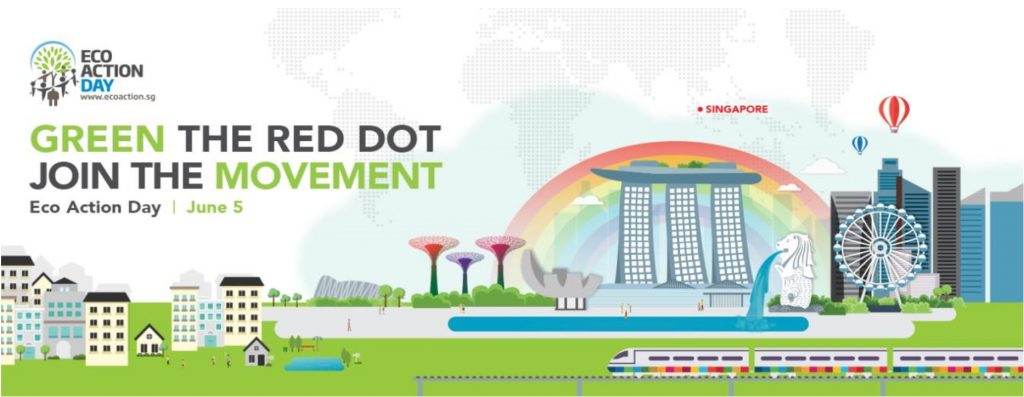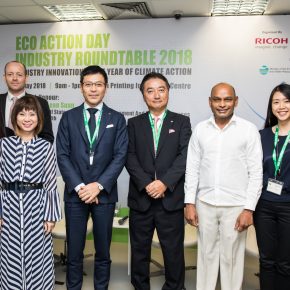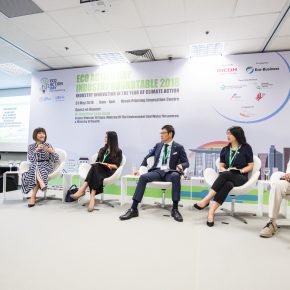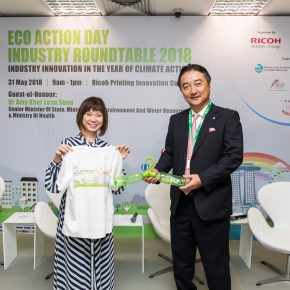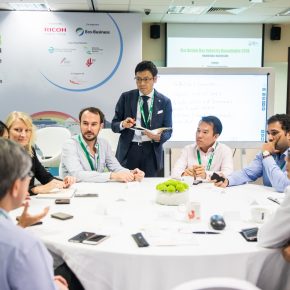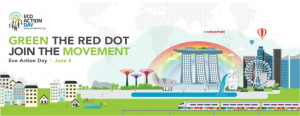
Eco Action Day is a national public awareness campaign organised by Ricoh Asia Pacific that aims to, along with various supporting partners, engage its employees customers, corporate neighbours, government organisations and the wider public to reduce their footprints on the environment. As part of Ricoh’s annually organised Eco Action Day campaign, this year’s Eco Action Day Industry Roundtable focused on the United Nations Sustainable Development Goal (UN SDG) 9 and how its principles are applicable on a local context. Entitled “Industry Innovation in the Year of Climate Action”, the emphasis on the UN SDG included ideas about promoting inclusive and sustainable industrialisation, building resilient infrastructure and fostering innovation. Organised in conclusion of the 2018 campaign and in conjunction with the annual World Environment Day (5 June), the event saw an enthusiastic attendance by government officials, senior business leaders and academic leaders that convened to examine the ways a sustainable industrialisation and infrastructure development can steer Singapore towards a greener future.
The roundtable event featured a 50 minute discussion session where participants from various companies and stakeholders discussed how companies can apply the UN SDG ideas in their industries that work towards a greener tomorrow in Singapore. The participants split into 4 tables headed by panelists J.D Kasamoto, General Manager of Service and Environment Division of Ricoh Asia Pacific, Crystynna Ewe, APJ Regional Director Global take back of Dell, Maggie Lee, Corporate Partnership Strategist of WWF and Professor Seeram Ramakrishna, Chair of Circular Economy Taskforce of National University of Singapore.
The following points were raised during this year’s roundtable discussion:
- Industry Innovation
- Managing end-of-life
- Driving the circular economy
- What the future will look like.
Industry Innovation
In the discussion on Industry Innovation, participants illuminated how both the private sector and government need to work hand in hand to achieve industry innovation and infrastructure development. Upstream processes in manufacturing were also identified as an important aspects that can ensure that products are designed to be recycled to reduce waste. It is interesting to note how with the Internet of Things (IoT), the average lifestyle of products is extended. This means that corporations can consider gearing towards being service providers rather than solely manufacturing with obsolescence and in turn, increasing the amount of waste created. With this change, the facilitation for a more sustainable product usage is made easier and even at a profit. It was then concluded that within companies, leaders and management, there needs to be a clear communication of their sustainability goals throughout the company, driving green innovation.
Managing End-of-Life
On the topic of managing product’s end-of-life, a more comprehensive spread of information was identified as an essential factor to increase consumer participation. From a manufacturer standpoint, the discussion found that products needed to be designed with recycling in mind. With this, the after-use processes will naturally be more sustainable and easier to manage. The standardisation of product materials were also proposed to facilitate recycling processes. The Government was another stakeholder that could contribute to the better management of product end-of-life. Regulations need to be enforced and not just implemented to ensure effectivity.
Driving The Circular Economy
The circular economy concept should be implemented by all industries, accelerated by collaboration between businesses. The discussion proposed that those who champion green initiatives and push the frontiers with regards to sustainability, should be rewarded as they set the standards for their industry. With this, they set a trend for incorporating sustainability as an integral element of production and business and with time, the trend becomes a norm. Furthermore, as governments create legislations that provide conditions for circular economy practises, individuals and corporations should embrace the principles of the circular economy. In addition to producer responsibility, members of corporations were also given an onus to be ambassadors and advocates of sustainability practises. Manufacturers and producers should also be more responsible of where their materials are sourced and where they eventuate, so as to ensure that waste is reduced.
What the Future Will Look Like
In the age of hyper consumerism, the roundtable hypothesised that if SDG 9 is neglected, the amount of waste the society generates will be unsustainable. Nonetheless, for us to realise what the future will look like, it pays to revisit past processes and learn from them. Moreover, corporations, the Government and society must also have the next generation in mind to be able to build the best and most liveable city.
How is This Relevant to Us Students?
As students and future contributors to the society, one of the key takeaways should be the philosophy of doing everything with sustainability in mind. Even from the learning grounds, we can start thinking of ways and understanding matters in terms of and with sustainability in mind. With extensive inquiry and exercising the concerns that surround the issue of sustainability even before we hit the workforce, we can be better prepared to counter the environmental issues that our previous generation are just starting to grapple with. Moreover, a good foundation and understanding about sustainability and its issues can better facilitate the way the upstream (where most of us will most likely contribute to) affects the sustainable ways of the products we manufacture or the businesses we engage in, driving the environment into a greener future.
The roundtable is also a clear manifestation of how a dialogical approach to the sustainability issue not only creates awareness but acts as a form of stewardship that encourages and educates many companies and stakeholders in the industry to recognise sustainability as a pertinent issue. As students, the interactions between the stakeholders give us a better understanding on the multifaceted issue that is sustainability in different industry, and with this knowledge, we should actively learn from the different perspectives and in turn question our own. It calls for a more active engagement and a less passive reception in knowledge.
Sustainability has an impending prevalence in the global arena and has changed the way businesses are done. As mentioned, those that champion green initiatives and push the frontiers with regards to sustainability, should be rewarded as they set the standards for the industry. As students, it is apt to actively engage with and adapt to the changing times by equipping ourselves with the necessary skills and knowledge to prepare for a more sustainable-centric future.
As Mr Kah Goto, Managing Director of Ricoh Asia Pacific, said:
“The challenges the world faces today range from climate change, globalisation and environmental degradation, to energy resource supply issues. The operating climate has changed over the years. At Ricoh, our operation continues to evolve as we align our commitment in excellence to improve the quality of living and drive sustainability.”
Indeed, the agency of Ricoh Asia Pacific in environmental issues is certainly something that we can learn from. The world’s needs and wants are changing and we have the responsibility to keep up with these demands and stay relevant to the conversation.


